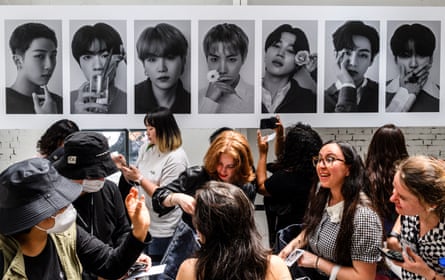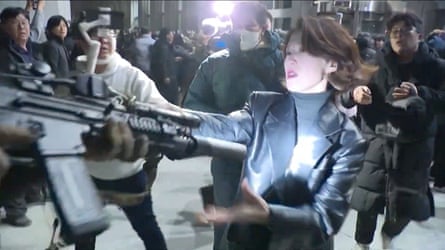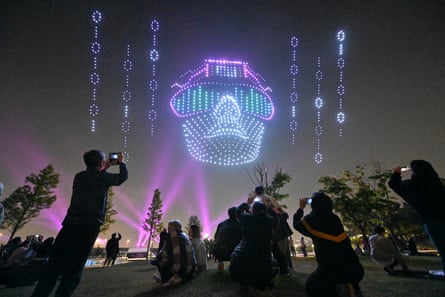In the global battle for soft-power supremacy, a clear winner has emerged in recent years: South Korea. Spearheaded by the boyband phenomenon BTS, the Korean Wave has turned a country that few knew much about into a cultural behemoth.
But just days ago, as anticipation grew over the start later this month of the second season of Squid Game – the first season of which is Netflix’s most-watched show – real-life dystopia intervened when the South Korean president, Yoon Suk Yeol, announced he was imposing martial law to root out “anti-state forces” and overcome political opponents who were obstructing his policy agenda.
Yoon, an arch-conservative, reversed course about six hours later after parliament, including some members of his party, voted to oppose the decree. But by then the reputational damage had been done, with the US – Seoul’s most important ally – Japan and the UK among those voicing “grave concern” over the short-lived slide into government by force.
 View image in fullscreen
View image in fullscreen
A global audience more accustomed to the positive vibes of K-pop were witnessing in real-time a side to South Korea that few recognised – one that for older citizens evoked the trauma of a time when their country was ruled by military dictators and democracy campaigners were shot dead in the street.
The most striking contrast between the Hallyu Wave – a huge portfolio of internationally acclaimed film, drama, pop music, and now literature – and the recent turmoil was evident outside the national assembly building in Seoul on Tuesday, where lawmakers clambered over walls and confronted armed soldiers to retake the democratic rights seized by their president, while military helicopters hovered overhead.
 View image in fullscreen
View image in fullscreen
As the uncertainty continued into the weekend, when parliament was due to vote on Yoon’s impeachment, South Koreans wondered whether their country would emerge from the chaos with its reputation intact.
“Our reputation has taken a serious hit,” said Seoul resident Kim Jung-ho. “We had built it up so much, especially this year with Han Kang winning the Nobel prize in literature and our peaceful global image. All of that crashed in an instant.”
Other people outside the national assembly believed the crisis had unexpectedly showcased the strength of the country’s democracy. “There might be some damage to our international image, but I’m less worried now,” said Bang Kyeong-rok, 31, a law student from Chonnam National University in Gwangju.
“The swift joint action by lawmakers and citizens to block this showed a positive side to Korea. Seeing how citizens responded, and particularly how reluctant the military was to fully enforce martial law, has made me more confident about our democracy’s resilience.”
In the decades since the 1950-53 Korean war – when the country’s economy was in worse shape than that of North Korea – South Korea has become Asia’s fourth-biggest economy and the producer of household names in car manufacturing and consumer electronics, with its population of 51 million connected by lightning-fast internet speeds.
 View image in fullscreen
View image in fullscreen
But despite its rapid economic and cultural achievements, the country still grapples with deep-rooted authoritarian tendencies in its institutions. These are often enabled and amplified by traditional hierarchies and networks, as demonstrated by the alleged key role of Yoon’s high school connections in the martial law crisis.
Had martial law prevailed for more than a chaotic few hours, political activity at the national and local level would have ceased and the country, observers said, would have been plunged into a “wartime, war-like situation”. A curfew would have been imposed and public demonstrations banned. The media would have been heavily censored; the powers of courts and government agencies suspended.
On Friday, it emerged that Yoon’s assault on his country’s fragile democracy included the planned arrests of key opposition politicians he had singled out, without evidence, as agents of the nuclear-armed regime in Pyongyang.
 View image in fullscreen
View image in fullscreen
“The president’s reckless martial law declaration has dealt massive economic damage and tarnished our national image both domestically and internationally,” said Nam Jae-sun, 46, a small business owner in the capital. This will be remembered as a symbolic setback for democracy in 2024.”
Elements of Yoon’s doomed scheme could have come from the North Korean playbook, but observers needn’t look further than South Korea’s recent history for evidence that despite its embrace of modernity, its hard-won political and civil freedoms can still be snatched away in the blink of a presidential eye.
It was only in 1988 when the Seoul Olympics marked South Korea’s emergence from nearly 30 years of military rule. As the country tried to rebuild after the Korean war, its leaders used martial law to put troops on the streets to prevent anti-government demonstrations.
Martial law was wielded with greatest enthusiasm by Park Chung-hee, a general who led several thousand troops into Seoul in May 1961 in a coup that installed as leader for almost 20 years. Park proclaimed martial law several times to jail opponents and stop protests before he was shot dead by his spy chief in 1979.
 View image in fullscreen
View image in fullscreen
Less than two months after Park’s assassination, Maj Gen Chun Doo-hwan oversaw the country’s second military coup, and a year later ordered troops to shoot at pro-democracy protesters in the southern city of Gwangju, killing hundreds.
Chun was forced to accept direct presidential elections after massive protests in 1987, with Roh Tae-woo, becoming the country’s first democratically elected president.
Young South Koreans would have dismissed as unimaginable a return to the days of the Gwangju massacre – until this week, when the country’s democracy teetered on the brink of collapse, reviving bitter memories among older people of a time of mass arrests and incarceration in “re-education” camps.
“When I first heard the martial law announcement I thought it must be fake,” said Bang Jeeyoung, a 55-year-old youth worker. “I thought that if it was real it would be terrifying, because I remembered the martial law period from my youth.”
But she added: “Rather than damaging Korea’s image, I think this could mark the end of our remaining undemocratic elements. If we overcome this, Korea will emerge as an even stronger democracy. This crisis exposed people who still harbour authoritarian mindsets, including the president himself. It showed us clearly what needs to change, and it has nothing to do with party politics.”
 View image in fullscreen
View image in fullscreen
A day before the expected impeachment vote, South Korea appeared to be pulling back from the brink, with reports of moves by Yoon’s party to remove him just a day after they said they would support him, while organisers predicted as many as 200,000 people would turn out in protests across the country.
As rumours swirled that Yoon could be about to impose martial law again, the leader of his People Power party [PPP], Han Dong-hoon, called for the president’s immediate suspension, warning that he could “put the Republic of Korea and its citizens in great danger”.
On Saturday, South Korea’s MPs – most of all the 108 lawmakers in Yoon’s party – face a stark choice: embrace the will of the people, or retreat into South Korea’s dark past.
∎